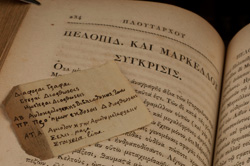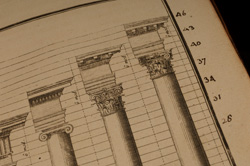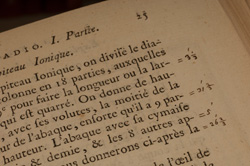
A Find of a Lifetime: Jefferson Books Quest Ends at Washington University
Last week, we had the privilege of being the first Monticello staff to set eyes on the more than 70 Jefferson books that we recently discovered at Washington University in St. Louis (WUSTL). We flew to St. Louis early on Valentine’s Day on February 14 to see firsthand the volumes Jefferson once owned in his library at Monticello during his retirement.

Our trip was the culmination of three months of intense and thrilling detective work done in cooperation with Erin Davis, Curator of Rare Books at WUSTL. Late last fall, Ann Lucas Birle was putting together the finishing touches on the forthcoming documentary edition of Thomas Jefferson’s Granddaughter in Queen Victoria’s England: The Travel Diary of Ellen Wayles Coolidge, 1838-1839, which she is editing with Lisa Francavilla. The book, a joint publication of the Thomas Jefferson Foundation and Massachusetts Historical Society, and distributed by University of Virginia Press, will be published in October 2011. At the same time, Endrina Tay was completing her research on the 1829 auction sale of Jefferson’s final library, as part of her work on Thomas Jefferson’s Libraries, a project to build a publicly accessible inventory of Jefferson’s libraries. Both of us were looking for Joseph and Ellen Coolidge’s library, and had reached dead ends. Our big break came on October 20, 2010, when Ann stumbled upon a reference in the Harvard Register in Google Books to the Joseph Coolidge Library. Three thousand books, “rare and of great value,” had been given to Washington University in 1880 by Joseph & Ellen Coolidge’s daughter and son-in-law, Ellen and Edmund Dwight. Ann shared this nugget with Endrina, and we both immediately knew what this meant. Not only had we found Joseph Coolidge’s library, we had very likely also located the whereabouts of Jefferson books that the Coolidges had bought from the 1829 auction sale. Endrina provided Erin from WUSTL with a listing of known Jefferson titles from her research.

On January 25, we received the news we were waiting for. Erin had pulled the books from their offsite storage facility, and confirmed that the volumes contained Jefferson’s distinctive ownership mark. Jefferson typically marked his books by adding his initial “T” to the I-quire signature, and his initial “I” (for J in the Latin alphabet) to the T-quire signature. We were thrilled and overjoyed that our suspicions had proved to be true. A few days later, Miranda Rectanwald from WUSTL’s archives found an undated library ledger with “c” annotations next to volumes, indicating that these were likely part of the original 3,000-volume gift to WUSTL. This ledger represents the only known catalog of the Joseph Coolidge Library.
Research is a collaborative process. The Robert H. Smith International Center for Jefferson Studies at Monticello actively brings together Jefferson scholars from different disciplines and eras. Monticello is in essence an academical village, like what Jefferson envisioned at the University of Virginia. Through regular face-to-face conversations and sharing of insights and ideas, we were able to see our twin projects converge and coalesce in the most unexpected and amazing way.

Among the Jefferson treasures at WUSTL are architecture books used by Jefferson to design the University of Virginia. Two of these volumes, Freart de Chambray’s Parallele de l'architecture antique avec la moderne and Andrea Palladio’s Architecture de Palladio, contenant les cinq ordres d'architecture, are referenced by Jefferson in his designs for the pavilions on the Lawn, and contain a few notes and calculations in Jefferson’s hand. Another three-volume set, Francesco Milizia’s Principj di architettura civile, is the work Jefferson received from Joseph Coolidge when he first met his future grandson-in-law at Monticello in May 1824. The first volume of this work contains Joseph’s inscription to Jefferson. We also held in our hands a Greek edition of Aristotle’s Politica, which Nicholas P. Trist (who was married to Virginia Randolph, Jefferson’s granddaughter) notes was among the last books Jefferson read just before his death on July 4, 1826.
This discovery makes WUSTL the third largest repository of Jefferson books after the Library of Congress and the University of Virginia. We are continuing to work with our WUSTL colleagues to reconstitute the 3,000 books that were in the collection at the time of the gift in 1880, and we are eagerly expecting to identify even more Jefferson and Jefferson family treasures in this vast legacy from the Coolidge family. So stay tuned ...
Related items:


